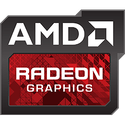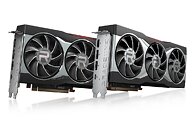Wednesday, November 11th 2020

AMD Radeon RX 6800 and RX 6800 XT GPU OpenCL Performance Leaks
AMD has just recently announced its next-generation Radeon RX 6000 series GPU based on the new RDNA 2 architecture. The architecture is set to compete with NVIDIA Ampere architecture and highest offerings of the competing company. Today, thanks to the well-known leaker TUM_APISAK, we have some Geekbench OpenCL scores. It appears that some user has gotten access to the system with the Radeon RX 6800 and RX 6800 XT GPUs, running Cinebench 4.4 OpenCL tests. In the tests, the system ran on the Intel platform with Core i9-10900K CPU with 16 GB DDR4 RAM running at 3600 MHz. The motherboard used was ASUS top-end ROG Maximus XII Extreme Z490 board.
When it comes to results, the system with RX 6800 GPU scored anywhere from 347137 points to 336367 points in three test runs. For comparison, NVIDIA GeForce RTX 3070 scores about 361042 points, showcasing that the Radeon card is not faster in any of the runs. When it comes to the higher-end Radeon RX 6800 XT GPU, it scored 407387 and 413121 points in two test runs. Comparing that to GeForce RTX 3080 GPU that scores 470743 points, the card is slower compared to the competition. There has been a Ryzen 9 5950X test setup that boosted the performance of Radeon RX 6800 XT card by quite a lot, making it reach 456837 points, making a huge leap over the Intel-based system thanks to the Smart Access Memory (SAM) technology that all-AMD system provides.
Source:
VideoCardz
When it comes to results, the system with RX 6800 GPU scored anywhere from 347137 points to 336367 points in three test runs. For comparison, NVIDIA GeForce RTX 3070 scores about 361042 points, showcasing that the Radeon card is not faster in any of the runs. When it comes to the higher-end Radeon RX 6800 XT GPU, it scored 407387 and 413121 points in two test runs. Comparing that to GeForce RTX 3080 GPU that scores 470743 points, the card is slower compared to the competition. There has been a Ryzen 9 5950X test setup that boosted the performance of Radeon RX 6800 XT card by quite a lot, making it reach 456837 points, making a huge leap over the Intel-based system thanks to the Smart Access Memory (SAM) technology that all-AMD system provides.


40 Comments on AMD Radeon RX 6800 and RX 6800 XT GPU OpenCL Performance Leaks
at the end, it seems that smart memory access works.
And 350k and 400k are respectable results.
Right now only, what...four mobos, work with it? Surely most will add support, but just in reality, an overwhelming majority of users are running Intel systems or X470 on down mobos, or would need to pay to upgrade to the 5000 series (sucks for those who bought Zen2).when supported.... yeah. See above. ;)
The nice thing about this though is that AMD is thus far leveraging mostly open source standards to do some of their tricks and features. As far as SAM goes, Intel and NVIDIA can also do similar, but they would have to pay for validation and driver maintenance (and more than likely will limit it as a feature to top-end SKUs to cut down on testing costs).
You can bet that Intel will do SAM-like capabilities once their Xe GPU matures enough; they would also need every bit of edge possible to pump up their numbers. And they too will eventually pursue their own take at an Intel-based heterogeneous computing ecosystem like AMD's IA. The only concern on the Intel side really is whether or not they will lock it to high-end SKUs to push high-margin silicon, or if they will follow AMD and allow it up and down the product stack. In the meantime, Intel could play nice and validate a variant of SAM between Intel and Radeon, even if it's only on the upper CPU SKUs (10600+). Intel has already worked with AMD once before with their weird NUC, and could do so again and just manage the drivers and compatibility lists between Intel CPUs and Radeon GPUs.
NVIDIA would have to implement, test, and complete validation of a SAM-like feature for both Intel and AMD CPUs at their own dime, should they have any desire to squeeze out every last bit of performance. And they would also have to maintain the drivers/compatibility lists since Intel and AMD aren't likely to do so. Either they limit such a feature to their high-end cards, or they permit it up and down the stack. Problem is they will probably pass on the testing/maintenance fees of such a feature into the card's MSRP; thus inflating it again.
Several percent... not enough to ignore other featureset differences. But I reckon for many in honest comparison this synergy will just be coming on top of an already pretty neat combo to base a rig on. Kinda struggling to see why you'd ignore the new Ryzen gen, its matured enough now on pretty much all fronts. Even just the IPC uplift... wow.
Also, we've seen a few notable teething issues, especially with memory. Updated BIOS' are coming in updating the AEGESA (not version, but patching) to resolve those issues. While normal, I'd say since these were available a few days ago, the teeting is just starting and this platform is nowhere near mature using the Ryzen new gen.
I don't have any reason for an upgrade to this 8700K either, but if you're running anything lower clocked and earlier gen... I mean all those Kaby Lake and Skylake quads? Perfect jump for them.
I discussed the 'rest of you mortals'. You took it another generation older not needing an upgrade, even... lol
I'll reiterate.... Those with a 9900K+ or Zen2 likely won't touch these... it just doesn't make sense. Anything before that, sure. That being said again, I still don't see adoption rates for the whole ecosystem taking shape for several months at least, likely a year+. These CPUs are less available than NV GPUs. Have you seen the emails from etailers touting availability of 2021 at the earliest? B&H said March, even. :(
What about those who held on to X470 for 5000 series support? They don't get these benes without buying a mobo now.
Again, all I am saying is that I'd really like to see performance running on an Intel system too so those, the majority, know how these will actually perform. :)
EDIT: I edited my previous post....note. :)
Who portrays this as counter competitive efforts? Maybe some hardcore clueless fanboys...?
Consoles don't hunger for anything. It's a closed ecosytem that is easy to optimize for (think Apple).
Nvidia and Intel envious? lol... I doubt that.
So again......... I just want to see benchmarks that reflects what the MAJORITY of users will see. I want to see BOTH results so everyeone is aware of exactly how these cards perform on a SAM system and those without.
SAM being 'popular' or not has nothing to do with it if you don't have the hardware to implement in the first place. It can only become popular when people go balls deep into specific (chipset) boards and 5000 series CPU. Also, I don't want a $99 B550 board, lol.... but I get your point.
It's going to take more time than you think. ;)
Whoever is reviewing these things.......... just show BOTH results so ALL users have an accurate idea of performance.
Vanilla 6800 scores 85% of the 6800XT with twelve fewer CUs.
When you talk about GPUs the 6000 series is faster then any AMD card that has come before. That alone is an objective reason to get it. Then you add the hardware benefit (that is important) of SAM that works with X570 and B550 but it's not like it's going to go away so it's an innovation, is that not reason alone to buy if you are an enthusiast?
The motherboard is important because as I said you can get B550 boards for $99 US. The point though is that right now most X570 and some B550 boards are attractively priced here in Canada. If I had a B450 board right now I would definitely be looking at something like the MSI B550 Pro. Even though that board has a "weak" VRM compared to others I can't see a 5600x or 5800X based system drawing more than 120 Watts from the CPU.
The key for these systems though is having a high refresh rate (Freesync2) monitor to allow the system to show it's true potential. Trust me if a 5600x system (I am finding that out right now) is indeed discernably faster by 20+% than the 3600 (I am using a 5700)in Gaming it's Game over. The 5600X has already increased by $50 on Newegg.ca. The 5800X is $600+ here in Canada but no one would be disappointed replacing what they have with one ( 9 series excluded).
All I want is to see both systems tested so users have accurate performance results for their systems.